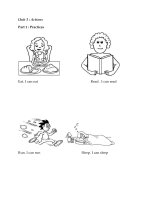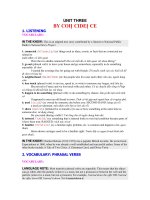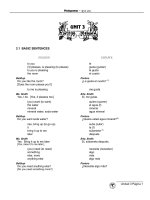UNIT 3 VOCAB + EXERCISES e8
Bạn đang xem bản rút gọn của tài liệu. Xem và tải ngay bản đầy đủ của tài liệu tại đây (77.09 KB, 6 trang )
UNIT 3. PEOPLES OF VIETNAM – DÂN TỘC VIỆT NAM
I. Vocabulary:
1. ancestor /ˈỉnsestə(r)/ (n) : ơng cha, tổ tiên
2. basic /ˈbeɪsɪk/ (adj) : cơ bản
3. complicated /ˈkɒmplɪkeɪtɪd/ (adj) : tinh vi, phức tạp
4. costume /ˈkɒstjuːm/ (n) : trang phục
5. curious /ˈkjʊəriəs/ (adj) : tị mị, muốn tìm hiểu
6. custom /ˈkʌstəm/ (n) : tập quán, phong tục
7. diverse /daɪˈvɜːs/ (adj) : đa dạng
8. diversity /daɪˈvɜːsəti/ (n) : sự đa dạng, phong phú
9. ethnic /ˈeθnɪk/ (adj) (thuộc): dân tộc
10. ethnic group /ˈeθnɪk ɡruːp/ (n) (nhóm): dân tộc
11. ethnic minority people /ˈeθnɪk maɪˈnɒrəti ˈpiːpl/ (n) : người dân tộc thiểu số
12. gather /ˈɡæðə(r)/ (v) : thu thập, hái lượm
13. heritage /ˈherɪtɪdʒ/ (n) : di sản
14. hunt /hʌnt/ (v): săn bắt
15. insignificant /ˌɪnsɪɡˈnɪfɪkənt/ (adj): không quan trọng, không ý nghĩa
16. major /ˈmeɪdʒər/ (adj): lớn, trọng đại, chủ yếu
-> majority /məˈdʒɒrəti/ (n): đa số
17. minor /ˈmaɪnər/ (adj) nhỏ, không quan trọng
-> minority /maɪˈnɒrəti/ (n): thiểu số
18. multicultural /ˌmʌltiˈkʌltʃərəl/ (adj) : đa văn hóa
19. recognize /ˈrekəɡnaɪz/ (v) : công nhận, xác nhận
20. shawl /ʃɔːl/ (n) : khăn quàng
21. specialty /ˌspeʃiˈæləti/ (n) : đặc sản
22. stilt house /stɪlt haʊs/ (n) : nhà sàn
23. terraced field /ˈterəst fiːld/ (n) : ruộng bậc thang
24. tradition /trəˈdɪʃn/ (n) : truyền thống
25. unique /juˈniːk/ (adj) : độc nhất, độc đáo
26. waterwheel /ˈwɔːtəwiːl/ (n) : cối xay nước
27. ceremony /ˈserəˌməni/ (n): nghi lễ ,lễ kỉ niệm
28. communal house /kəˈmju:nl haus/ (n): nhà cộng đồng
29. mountainous /ˈmauntənəs/(adj): có núi
30. poultry /’pəʊltri/(n): gia cầm
31. region/ ˈriʤən/ (n): vùng
32. worship /‘wərʃip/(v): thờ phụng
II. Grammar:
I. MẠO TỪ KHÔNG XÁC ĐỊNH: A/ AN
A. Lý thuyết:
1. A đứng trước một phụ âm hoặc một nguyên âm (a, e, i, o, u) có âm là phụ âm.
- a game (một trò chơi); a boat (một chiếc tàu thủy)
- a university (một trường đại học); a year (một năm)
- a European (một người Âu); a one-legged man (một người thọt chân)
2. An đứng trước một nguyên âm hoặc một h câm.
- an egg (một quả trứng); an ant (một con kiến)
- an honour (một niềm vinh dự); an hour (một giờ đồng hồ)
3. An cũng đứng trước các mẫu tự đặc biệt đọc như một nguyên âm.
- an SOS (một tín hiệu cấp cứu); an MSc (một thạc sĩ khoa học), an X-ray (mơt tia X)
4. A/An có hình thức giống nhau ở tất cả các giống.
- a tiger (một con cọp); a tigress (một con cọp cái)
1
- an uncle (một ông chú); an aunt (một bà dì)
B. Ví dụ:
1. Trước một danh từ số ít đếm được.
- We need a computer. (Chúng tôi cần một máy vi tính)
- He eats an ice-cream. (Anh ta ăn một cây kem)
2. Trước một danh từ làm bổ túc từ (kể cả danh từ chỉ nghề nghiệp)
- It was a tempest. (Đó là một trận bão dữ dội)
- She’ll be a musician. (Cô ta sẽ là một nhạc sĩ)
- Peter is an actor. (Peter là một diễn viên)
3. Trong các thành ngữ chỉ số lượng nhất định
- a lot (nhiểu); a couple (một cặp/đôi); a third (một phần ba)
- a dozen (một tá); a hundred (một trăm); a quarter (một phần tư)
4. Trong các thành ngữ chỉ giá cả, tốc độ, tỉ lệ ...
- 90 kilometres an hour (chín mươi kilomet/giờ)
- 4 times a day (bốn lần mỗi ngày)
- 2 dollars a litre (hai đơ la một lít)
(a/an = per (mỗi))
5. Trong các thành ngữ chỉ sự cảm thán
- What a pity! (thật đáng tiếc!)
- Such a picturesque hill! (một ngọn đồi thật thơ mộng!)
- What a beautiful painting! (một bức tranh tuyệt vời!)
6. a có thể đứng trước Mr/Mrs/Miss + họ
- a Mr Smith, a Mrs Smith, a Miss Smith
II. MẠO TỪ XÁC ĐỊNH: THE
The dùng cho cả danh từ đếm được (số ít lẫn số nhiểu) và danh từ không đếm được.
The truth (sự thật)
The time (thời gian)
The bicycle (một chiếc xe đạp)
The bicycles (những chiếc xe đạp)
* * * Không dùng mạo từ xác định:
1. Trước tên quốc gia, tên châu lục, tên núi, tên hồ, tên đường.
Europe (Châu Âu), South America (Nam Mỹ), France (nước Pháp)
2. Khi danh từ không đếm được hoặc danh từ số nhiều dùng theo nghĩa chung nhất, chứ không
chỉ riêng trường hợp nào.
- I don’t like French beer. (Tơi chẳng thích bia của Pháp.)
- I don’t like Mondays. (Tơi chẳng thích những ngày thứ Hai.)
3. Trước danh từ trừu tượng, trừ phi danh từ đó chỉ một trường hợp cá biệt.
- Men fear death. (Con người sợ cái chết.)
(But) - The death of the President made his country acephalous.
(Cái chết của vị tổng thống đã khiến cho đất nước ông không có người lãnh đạo).
4. Sau sở hữu tính từ hoặc sau danh từ ở sở hữu cách
- My friend, chứ khơng nói My the friend
- The girl’s mother = the mother of the girl (Mẹ của cô gái)
5. Trước tên gọi các bữa ăn
-They invited some friends to dinner. (Họ đã mời vài người bạn đến ăn tối)
6. Trước các tước hiệu
- President Roosevelt (Tổng thống Roosevelt)
- King Louis XIV of France (Vua Louis XIV của Pháp)
7. Trong các trường hợp sau đây:
- Women are always fond of music. (Phụ nữ ln thích âm nhạc.)
- Come by car/ by bus (Đến bằng xe ôtô/ xe buýt)
2
- In spring/ in autumn (Vào mùa xuân/ mùa thu), last night (đêm qua), next year (năm tới),
from beginning to end (từ đầu tới cuối), from left to right (từ trái sang phải)
III. Exercises:
Ex1. Fill in each blank with one suitable WH word.
1. …………is the weather like today? – It’s fine.
2. ……………..is it from here to your home? – Two kilometers.
3. Can you hear those people? …………..are they talking about? – About taxes.
4. …………car is it? – It is Mr. Brown’s.
5. ………….didn’t you go to work yesterday? – Because I was sick.
6. We have got two shirts of the same kind. …………one would you like? – I’d like the white
one.
7. Do you remember…….…and ………Uncle Ho was born? – He was born in Nghe An in1890.
8. …….…………cats does she raise? – She raises twenty.
9. ……………..long are you going to study here? – For at least two courses.
10. Do you know…………….fast that plane is flying? – I am not sure.
11. ……………did the accident happen? – At 3 p.m.
12. ………………..do you visit your grandparents? – Once a month.
13. I want two stamps and an envelope. ………………does it cost? – It is 50 p.
14. I go to school by bike. ……………….do you get there? – On foot.
15. ……………does Nam work? – In Hai Phong.
16. By………………was Hamlet written? – By Shakespeare.
17. ……………….does English belong to? – It belongs to those who use it.
18. ……………….is the river? – It is 2.5 meters deep.
19. ………………was Isaac Newton when he died? – He was 85.
20. ………………….water does an elephant drink a day? – Two liters.
Ex2. Choose the best answers A, B, C or D to complete the sentences.
1. We are looking for
place to spend
night.
A. the-the
B. a-the
C. a-a
D. the-a
2. Please turn off
lights when you leave
room.
A. the-the
B. a-a
C. the-a
D. a-the
3. We are looking for people with
experience.
A. the
B. a
C. an
D. Ø
4. Would you pass me
salt, please?
A. a
B. the
C. an
D. Ø
5. Can you show me
way to
station?
A. the – the
B. a – a
C. the – a
D. a – the
6. She has read
interesting book.
A. a
B. an
C. the
D. Ø
7. You’ll get
shock if you touch
live wire with that screwdriver.
A. an – the
B. Ø – the
C. a – a
D. an – the
8. Mr. Smith is
old customer and
honest man.
A. an – the
B. the – an
C. an – an
D. the – the
9.
youngest boy has just started going to
school.
A. A – Ø
B. Ø – the
C. an – Ø
D. The – Ø
10. Do you go to
prison to visit him?
A. the
B. a
C. Ø
D. an
11.
eldest boy is at
college.
A. a – the
B. The – Ø
C. Ø – a
D. an – x
12. Are you going away next week? - No,
week after next.
A. an
B. a
C. the
D. Ø
3
13. Would you like to hear
story about
English scientist?
A. an – the
B. the – the
C. a – the
D. a – an
14. There’ll always be a conflict between
old and
young.
A. the – the
B. an – a
C. an – the
D. the – a
15. There was
collision at
corner.
A. the – a
B. an – the
C. a – the
D. the – the
16. My mother thinks that this is
expensive shop.
A. the
B. an
C. a
D. Ø
17. Like many women, she loves
parties and
gifts.
A. the – a
B. a – the
C. a – a
D. Ø – Ø
18. She works seven days
week.
A. a
B. the
C. an
D. Ø
Ex3. Read the following text, and fill in the blanks with the suitable words given.
built
located
that
houses
history
opened
which
year
Duong Lam Village is (1)
in Duong Lam Commune at a 45 km distance from Ha
Noi. It is the birthplace of two kings in the (2)
of Vietnam, Phung Hung (or Bo
Cai Dai Vuong) andNgo Quyen, who (3)
up the long-term self-control and independence
period of Viet Nam after Bach Dang Victory in the (4)
938.
All houses, gates, village gates and wells are (5)
of laterite creating an architectural
complex, a unique village (6)
is typical for villages in the midlands in the
North of Vietnam.
At present, there are still nearly old 200 (7)
and many other historical
monuments such as Phung Hung Temple, Ngo Quyen Royal Tomb, Mong Phu Communal House,
Ho Gam Hill at (8)
Phung Hung killed tigers to rescue villagers and the temple at
which the diplomat Giang Van Minh is worshiped.
Ex4. Choose the best answer A, B, C or D to complete the sentences.
1.
is a large piece of furniture where you can hang your clothes.
A. Wardrobe
B. Refrigerator
C. Desk
D. Counter
2. Alec said to
that he was lucky to be alive.
A. he
B. his
C. himself
D. myself
3. Children
drink milk every day. - It’s good for them.
A. must
B. ought
C. don’t have to
D. must not
4. I think Angela
to buy that coat, it’s really lovely.
A. must
B. ought
C. should
D. have
5. We’ll go swimming today
it’s hot.
A. so
B. because
C. so that
D. then
6. Let me
your bag.
A. carry
B. to carry
C. to carrying
D. carrying
7. I tried
her name but I couldn’t.
A. remember
B. to remember
C. remembering
D. to remembering
8. We live in the room
the store.
A. above
B. on
C. over
D. up
9. It’ll take me an hour to do the household
.
A. work
B. chores
C. job
D. exercises
10. The
put too much salt in the food.
A. cook
B. cooker
C. stove
D. oven
4
11. The Gong Festival is held
in the Central Highlands.
A. year
B. which
C. annual
D. annually
12.
does Hoa Ban Festival take place? - In Lai Chau.
A. What
B. Where
C. When
D. How
13. It is typical of the cultural life of
Thai people.
A. some
B. a
C. the
D. Ø
14.
do the cattle provide for the nomads? - Dairy products, meat, and clothing,,
A. What
B. Where
C. Why
D. How
15. The crops
on the weather.
A. depend heavy
B. depend heavily
C. affect heavy
D. affect heavily
16. Mai studies Maths a little bit
.
A. bad
B. badly
C. good
D. smartly
17. During the festival, they fly many
kites in different shapes and sizes.
A. colour
B. colourless
C. colourful
D. colouring
18. An old woman was
the goats up the mountainside.
A. riding
B. taking
C. herding
D. running
19.
is the festival celebrated? – Every year.
A. When
B. How often
C. How
D. What
20. There are no high buildings to block
in our village.
A. view
B. a view
C. some view
D. the view
Ex5. Read the following passage and choose the item (A, B, C or D) that best answers each
of the questions about it.
Hi! My name is John. I live in Liverpool. Liverpool is a large city in the north of England. I
live with my parents, my two brothers and my sister. We live in a large house.
In our house, there is a big kitchen, a dining room, a large living room, and a toilet. There is
also a separate room for our washing machine and freezer. Upstairs there are five bedrooms, two
bathrooms, and another toilet. Outside, there is a large garden. There are two garages.
1. Where does John live?
A. In England
B. In Wales
C. In Scotland
D. In France
2. How many people are there in John’s family?
A. 4
B. 5
C. 6
D. 7
3. How many rooms are there in John’s house?
A. 10
B. 11
C. 13
D. 14
4. Dining room is the room in a house where you
.
A. usually relax in comfortable chairs
B. eat meals
C. cook food and wash dishes
D. wash your body
5. Which of the following is not true?
A. John’s family live in a large house.
B. John’s house is big but doesn’t have any gardens.
C. The kitchen in John’s house is big.
D. John’s house has two garages.
5
PART 2: EXECISES
A. PHONETICS
I.
1. D
2. C
II.
1. B
2. A
3. D
3. D
4. B
4. B
B. VOCABULARY AND GRAMMAR
I.
1. the person
2. the only cinema
4. the British Museum
5. church
7. The Prime Minister
8. Computer
10. the a thousand pounds 11. under the impression
13. at a profit
14. on the whole
16. in pain
17. out of danger
19. the cross- channel ferry 20. the back of my neck
II.
1. the
2. a
3. the
4. the
6. the
7. the
8. a - the
9. An – the
III. 1. C
2. A
3. D
4. B
7. B
8. C
9. D
10. C
13. D
14. A
15. C
16. B
C. READING
I.
1. C
II.
1. A
5. D
III. 1. located
5. built
2. D
2. B
6. D
3. D
3. C
7. C
2. history
6. that
4. A
4. A
8. B
3. opened
7. houses
5. B
5. A
3. a Thames barge
6. a milk jug
9. an open-air theatre
12. a hurry
15. on the average
18. in the way
5. a
5. A
11. B
17. D
6. B
12. C
18. A
5. C
4. year
8. which
D. WRITING
I.
1. on
2. in
3. down
4. arrived
5. nobody
6. tired
7. into
8. sky
9. stopped 10. start
11. looked 12. above
13. decided 14. shouted 15. mountain
II.
1. My work isn’t as good as yours.
2. Nobody is older than Dick in the family.
3. If she didn’t lose the key, she could get into the house.
4. They are not old enough to join the army.
5. If you invite her, she will come.
6. The picture is too heavy to hang on the wall.
7. They were not only tired but also hungry.
8. Finishing their work, they went home.
9. If she did not go out in the rain, she would not get wet.
10. Tom is not strong enough to lift the table.
6









